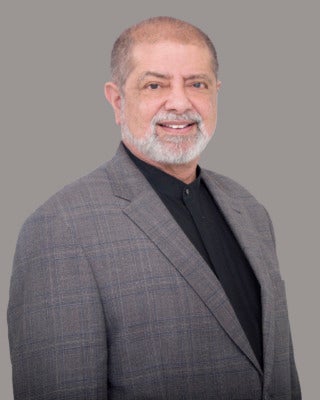Ashfaq Taufique has called the South home for more than 45 years. And there’s nowhere else the devout Muslim would rather live.

Taufique is president emeritus of the Birmingham Islamic Society, and one of its original members. Born and raised in Pakistan, Taufique immigrated to the United States when he was 25 years old. The retired mechanical engineer attended college in Texas before moving to North Carolina and Georgia and finally settling in Alabama in 1989.
A member of the Inclusive America Project’s Powering Pluralism Network, Taufique is candid about his experiences with religious discrimination and his thoughts on pluralism and America’s ideals.
“9/11 was a life-changing experience; Birmingham, with its civil rights history, and being a little more cosmopolitan, was not quite as bad some of the cities (if you went 50 miles in any direction it was a different world),” he said. “But it gave us a lot of opportunities to talk about Islam and Muslims and what we really are. To be an ambassador of our faith and people.”
The 70-year-old shared his stories about love and hate following the heinous event that seemingly changed the pulse of America. From the former colleague of nearly a decade who approached him in his office days later and simply said “I could kill you” before simply walking out, to the woman who filled the answering machine tape at his mosque with her effusive insistence that Muslims were welcome in the community.
Amid all of these and countless other experiences as an immigrant and religious minority in America, Taufique has hope.
“It’s about having one conversation at a time,” he said simply. “Changing one heart at a time.”
A father of four who is married to an Italian American Catholic who only converted to Islam after 31 years together, Taufique is realistic and knows nothing will change overnight. It may take a lifetime of effort to make a dent in the next generation largely because we are a divided country and world right now, one where national supremacy and racial supremacy are actively opposing those who want to make this world a peaceful place,
Taufique opined.
“There’s no formula to solve it,” he said as he reflected on a visiting Islamic scholar he met who noted there is a mixture of truth and falsehoods in all sides. “A clear distinction has to come between truth and false before we can march towards a just society.”
Taufique believes he is optimistic largely because he grew up with an appreciation for people of different faiths and cultures. He attended a Catholic missionary school, and lived in Karachi with Shia, Parsi (Zorastrian), Baha’i families, and even an English gentleman as neighbors in the apartment building where he lived with his extended family.
“One of my best buddies in 8th to 10th grades was a Catholic Christian, and on Saturdays we used to go out and paint the town red,” Taufique recalled fondly. “He went to church – St. Patrick’s cathedral – and I would stay outside. Then, at sunset time, I’d go do my prayers at mosque and he would wait outside. It was not expected that we had to celebrate Eid or Christmas together.”
To Taufique, pluralism means that “we embrace our brothers and sisters from various faiths without compromising our value systems.”
Which is important to him.
“I call myself a fundamentalist in terms of practices, trying not to adulterate just because I’m living in America,” he shared. “But at same time, I have respect and understanding. I may not agree with what Hindus and Christians and Jews believe, but I have not just respect, but really understanding, for all people. It’s actually part of Islamic faith.”
The bigger problem he says, may be the division in the country and our very ideals themselves. Determining what America wants as its goals may be the first step, he said, as he points out that the theoretical goals of this country are lofty when you consider America’s history, particularly slavery.
Taufique then shared two anecdotes, one from a Black Muslim who simply said that Taufique was treated better than he was, and another from an Agnostic but culturally Jewish friend who bluntly pointed out America’s ideals and values aren’t for everyone – particularly not for Black men. He points out that, if you look at the murders of George Floyd and others, and you look at the recent hate crimes against Asian Americans, you must see America’s ideals are not as lofty as we dreamed them to be.
“The issue is not theology,” he said. “The issue is the political and economic power.
The political and economic domination – regardless if real or perceived – that’s what causes issues.”
“Racism, nationalism, considering yourself superior has existed since Adam, it’s not going to go away,” Taufique continued. “But extreme right groups from all religions must become part of embracing that America is secular and not just a Christian nation.”
Nevertheless, one thing about this country he finds affirming and positive is that he can speak his mind. That everyone can speak their mind.
“We just have to keep on working and trying. And it all gives us all lots of opportunity,” Taufique said. “Muslims, liberals, Agnostic, we all must get together and cheer each other on.”
For as long as he’s been a member, the Birmingham Islamic Society has been part of interfaith groups in the area. Islamic Society members attend other worship services as observers and have opened their Masjid to the community at large for various programs for the benefit for the community, and also for the observance of worship.
“More than 95 percent of those who attend are our friends, they come for a good meal and to laugh and learn about faith and culture,” Taufique said.
Breaking bread and creating those new friendships may be what will matter in the end, because he believes, at its heart, true change and understanding is inherently about humanity and dignity.
Ashfaq Taufique is part of Inclusive America’s Powering Pluralism Network’s cohort on religious leadership. Learn more about the Powering Pluralism Network.
The views and opinions expressed in this blog do not necessarily reflect those of the Aspen Institute.

